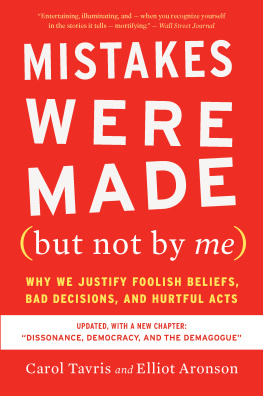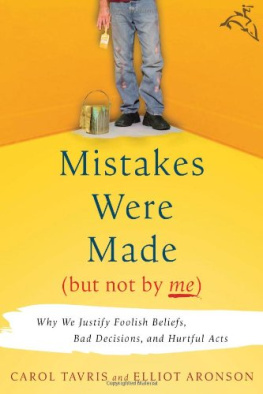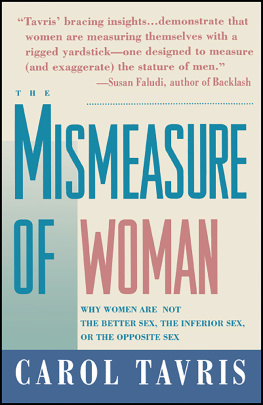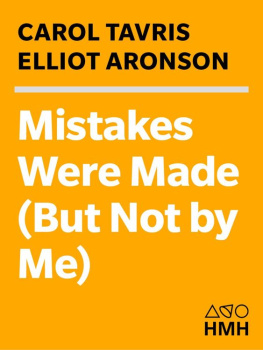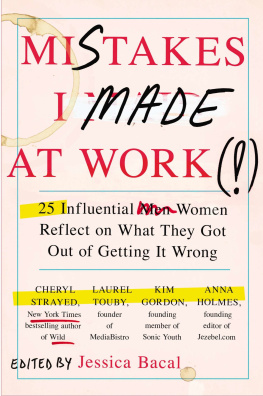Carol Tavris - Mistakes Were Made (But Not by Me)
Here you can read online Carol Tavris - Mistakes Were Made (But Not by Me) full text of the book (entire story) in english for free. Download pdf and epub, get meaning, cover and reviews about this ebook. year: 2008, publisher: HMH Books, genre: Politics. Description of the work, (preface) as well as reviews are available. Best literature library LitArk.com created for fans of good reading and offers a wide selection of genres:
Romance novel
Science fiction
Adventure
Detective
Science
History
Home and family
Prose
Art
Politics
Computer
Non-fiction
Religion
Business
Children
Humor
Choose a favorite category and find really read worthwhile books. Enjoy immersion in the world of imagination, feel the emotions of the characters or learn something new for yourself, make an fascinating discovery.
- Book:Mistakes Were Made (But Not by Me)
- Author:
- Publisher:HMH Books
- Genre:
- Year:2008
- Rating:4 / 5
- Favourites:Add to favourites
- Your mark:
- 80
- 1
- 2
- 3
- 4
- 5
Mistakes Were Made (But Not by Me): summary, description and annotation
We offer to read an annotation, description, summary or preface (depends on what the author of the book "Mistakes Were Made (But Not by Me)" wrote himself). If you haven't found the necessary information about the book — write in the comments, we will try to find it.
Carol Tavris: author's other books
Who wrote Mistakes Were Made (But Not by Me)? Find out the surname, the name of the author of the book and a list of all author's works by series.
Mistakes Were Made (But Not by Me) — read online for free the complete book (whole text) full work
Below is the text of the book, divided by pages. System saving the place of the last page read, allows you to conveniently read the book "Mistakes Were Made (But Not by Me)" online for free, without having to search again every time where you left off. Put a bookmark, and you can go to the page where you finished reading at any time.
Font size:
Interval:
Bookmark:
For Leon Festinger, creator of the theory of cognitive dissonance, whose ingenuity inspired this book
Copyright 2007, 2015, 2020 by Carol Tavris and Elliot Aronson
All rights reserved
For information about permission to reproduce selections from this book, write to or to Permissions, Houghton Mifflin Harcourt Publishing Company, 3 Park Avenue, 19th Floor, New York, New York 10016.
hmhbooks.com
Library of Congress Cataloging-in-Publication Data is available.
ISBN 978-0-358-32961-9
eISBN 978-0-547-41603-8
v5.0420
Cover design Houghton Mifflin Harcourt
Frank and Debra extract from Andrew Christensen and Neil S. Jacobsons Reconcilable Differences is 2000 Guilford Press and is reprinted with permission of Guilford Press.
We are all capable of believing things which we know to be untrue, and then, when we are finally proved wrong, impudently twisting the facts so as to show that we were right. Intellectually, it is possible to carry on this process for an indefinite time: the only check on it is that sooner or later a false belief bumps up against solid reality, usually on a battlefield.
George Orwell, 1946
I see no reason why I should be consciously wrong today because I was unconsciously wrong yesterday.
Supreme Court Justice Robert H. Jackson, 1948
When the first edition of this book was published, in 2007, the country had already become polarized by the war in Iraq. Although Democrats and Republicans were initially equally likely to support George W. Bushs decision to invade, believing that Saddam Hussein was developing weapons of mass destruction, it soon became clear that he wasnt, and none were ever found. WMDs had vanished, but not political polarization, which we saw for ourselves in the reviewers of our book on Amazon.
Many conservatives were (and some still are) deeply annoyed by their perception that we were bashing Bush unfairly. One, who titled his review Almost Great and gave Mistakes Were Made three stars, said the book would have been truly great if we hadnt spent so much damned time trying to impose our political views on the reader and ignoring the mistakes and bad decisions that Democrats made. Any future edition, he advised, should delete all the Bush lied examples so it didnt seem like there was one on every fourth page.
Then we found a rebuttal review headed Truly Great! and giving the book five stars. This isnt a book about politics alone, this reviewer said, but about all aspects of human behavior. She found it extremely balanced, noting it discussed the mistakes, self-justifications, and delusions of members of both partiesfor example, Lyndon Johnsons inability to get out of Vietnam was compared to Bushs determination to stay the course in Iraq.
For reasons that will be clear as you read this book, we enjoyed the second of these two Amazon reviews much more than the first. What a brilliant, astute reader, we thought, obviously so well informed! Whereas the first reviewer was completely muddled. Biased? Us? Dont be absurd! Why, we bent over backward to be fair! A Bush-lied example on every fourth page and we didnt have a bad word for Democrats? Didnt this reader see our criticism of LBJ, whom we called a master of self-justification? How did he miss the Republicans we praised? And how did he misunderstand our main point, that George Bush was not intentionally lying to the American public about Saddam Husseins alleged weapons of mass destruction but doing something all leaders and the rest of us do: lying to himself to justify a decision he had already made? And besides, we said, warming to our own defense, Bush was president when we began writing this book, and the costly war was dividing the nation. Its consequences are with us today, in the continuing warfare and chaos in the Middle East. What other example could have been as powerful or important an opening story?
Then, after reveling in our spasm of self-justification in response to the first reviewer, we had to face the dreaded question: Wait a minuteare we right, or are we merely justifying ourselves? What ifhorrors!he has a point? As human beings, the two of us are not immune to the pitfalls of thinking that we describe in our own book. No human being can live without biases, and we have ours. But we wrote this book with the goal of understanding them and shining a light on their operation in all corners of peoples lives, including our own.
In the years since this book first appeared, readers, reviewers, neighbors, and friends have sent us comments, studies, and personal stories. Professionals in fields as different as dentistry, engineering, education, and nutrition urged us to add chapters on their experiences with recalcitrant colleagues who refused to pay attention to the data. Friends in England and Australia formed the Mistakes Were Made Irregulars to let us know who was using this iconic phrase in their countries.
We realized that a revision could easily be twice as long as the original without being twice as informative. For the second edition (2015), we updated the research and offered examples of attempts by organizations to correct mistakes and end harmful practices (for instance, in criminal prosecutions, methods of interrogation, hospital policies, and conflicts of interest in science). Tragically, but not surprisingly for anyone who reads this book, there have not been nearly enough of those systematic corrections, and in some areas, deeply felt but incorrect beliefs, such as those held by people who oppose vaccinating their children, have become even more entrenched. We made a major change in chapter 8 by addressing an issue we had intentionally avoided the first time around: the problems that arise for people who cannot justify their mistakes, harmful actions, or bad decisions and who, as a result, suffer PTSD, guilt, remorse, and sleepless nights for far too long. There we offered research and insights that might help people find a path between mindless self-justification and merciless self-flagellation, a path worth struggling to discover.
And then, not long after the second edition appeared, Donald Trump was elected president of the United States, immediately exacerbating the political, ethnic, racial, and demographic tensions that had been growing for decades. Of course, political polarization between left and right, progressive and traditional, urban and rural, has existed throughout history and is still found all over the planet, with each side seeing the world through its preferred lens. But the Trump phenomenon is unique in American history, because Trump intentionally violated the rules, norms, protocols, and procedures of governmentactions that his supporters applauded, his adversaries condemned, and many of his former opponents came to endorse. Whether or not Trump is in office as you read this, Americans will long be facing the moral, emotional, and political residue of his presidency.
It seems like eons since Republican nominee Bob Dole described Bill Clinton as my opponent, not my enemy, but in fact he made that civilized remark in 1996. How quaint it now seems in contrast to Donald Trump, who regards his opponents (or people who simply disagree with him) as treasonous, disloyal rats and foes. In our new concluding chapter, therefore, we closely examine the process by which Trump, his administration, and his supporters fostered that view, with devastating consequences for our democracy. We wrote this chapter in the hope that once we understand the slow but pernicious shift in thinking from opponent to enemy, we can begin to find our way back.
Carol Tavris and Elliot Aronson, 2020
Font size:
Interval:
Bookmark:
Similar books «Mistakes Were Made (But Not by Me)»
Look at similar books to Mistakes Were Made (But Not by Me). We have selected literature similar in name and meaning in the hope of providing readers with more options to find new, interesting, not yet read works.
Discussion, reviews of the book Mistakes Were Made (But Not by Me) and just readers' own opinions. Leave your comments, write what you think about the work, its meaning or the main characters. Specify what exactly you liked and what you didn't like, and why you think so.

